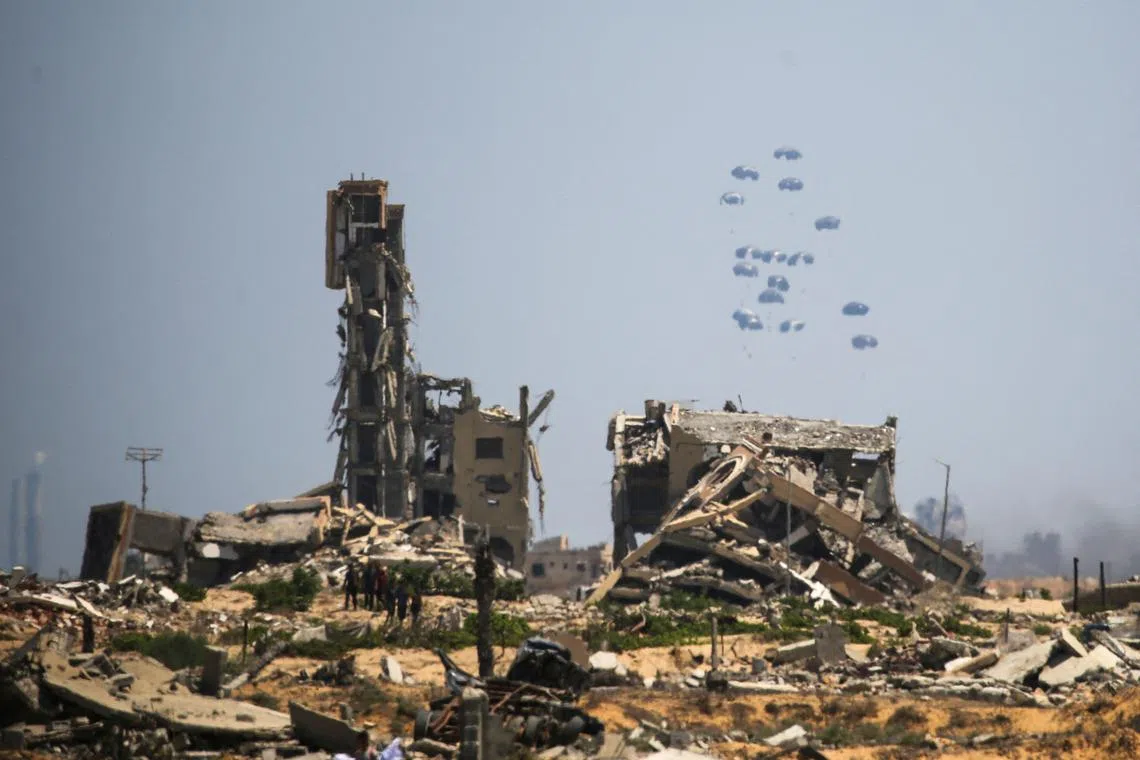For Trump administration, US airdrops of Gaza aid were never a serious option, sources say
Sign up now: Get ST's newsletters delivered to your inbox

One source said it is seen as an unrealistic option because airdrops would not come close to meeting the needs of 2.1 million Palestinians.
PHOTO: AFP
Follow topic:
WASHINGTON - During President Joe Biden's administration, the US military carried out waves of airdrops of food into Gaza, delivering some 1,220 tonnes of assistance.
But the option has not been seriously considered by Mr Donald Trump's administration, US officials and other sources say, even as he voices concern over starvation in Gaza
One source said it is seen as an unrealistic option because airdrops would not come close to meeting the needs of 2.1 million Palestinians.
This comes even as close US allies including Jordan, the United Arab Emirates and Britain have carried out airdrops of assistance to Gaza.
Humanitarian aid groups have long been critical of airdrops of aid, calling them more symbolic than truly effective when the scale of the need in Gaza requires open land routes for large amounts of aid to enter the enclave.
The heavy packages could also present a danger to civilians on the ground rushing toward the parachuting aid.
“It just hasn’t been part of the discussions,” said one US official, speaking on condition of anonymity to discuss internal Trump administration deliberations.
A source familiar with the issue said: “It hasn’t been a serious consideration because it’s not really a serious option at this moment.”
Some US officials war-gamed the option and found “it’s absolutely unrealistic”, said the source familiar with the matter.
The source said it was unknown how “big a lift capacity” could be managed even if the Israelis approved US use of the airspace.
A diplomatic source, speaking on condition of anonymity, said he was unaware of any US interest in participating in the airdrop effort.
Another official in a US-allied country which is taking part in the airdrops said there had been no conversations with the US about Washington taking part in the effort.
The official added that the US was not providing logistical support for the airdrops being carried out by other countries.
Asked for comment, a White House official said the administration was open to “creative solutions” to the issue.
“President Trump has called for creative solutions ‘to help the Palestinians’ in Gaza. We welcome any effective effort that delivers food to Gazans and keeps it out of the hands of Hamas,” the White House official said.
Israel began allowing food airdrops in late July, as global concern mounted about the humanitarian toll in Gaza from the war.
Mounting pressure on Israel
Mr Trump has backed efforts by the Gaza Humanitarian Foundation (GHF) to distribute aid to Gazans.
He has said the US would work with other countries to provide more humanitarian assistance to the people of Gaza, including food and sanitation.
But he has also expressed frustration with the ongoing conflict, saying Hamas leaders would now be “hunted down”, telling reporters on July 26: “Hamas really didn’t want to make a deal. I think they want to die. And it’s very bad. And it got to be to a point where you’re going to have to finish the job.”
Israel faces intensifying international pressure over the humanitarian crisis in Gaza and its promotion of GHF's aid operation, which has distribution sites only in southern Gaza and has been called dangerous and ineffective by aid groups and the United Nations – claims the group denies.
As the death toll from two years of war in Gaza
Mr Biden faced enormous pressure from fellow Democrats to alleviate the humanitarian suffering in Gaza.
In addition to aiddrops of food assistance including ready-to-eat meals, Mr Biden ordered the US military to construct a temporary pier off Gaza for aid to be delivered to the enclave.
The pier, announced by the former president during a televised address to Congress in March 2024, was a massive endeavour that took about 1,000 US forces to execute
But bad weather and distribution challenges inside Gaza limited the effectiveness of what the US military says was its biggest aid delivery effort ever in the Middle East.
The pier was operational only for about 20 days and cost about US$230 million (S$295.77 million). REUTERS

